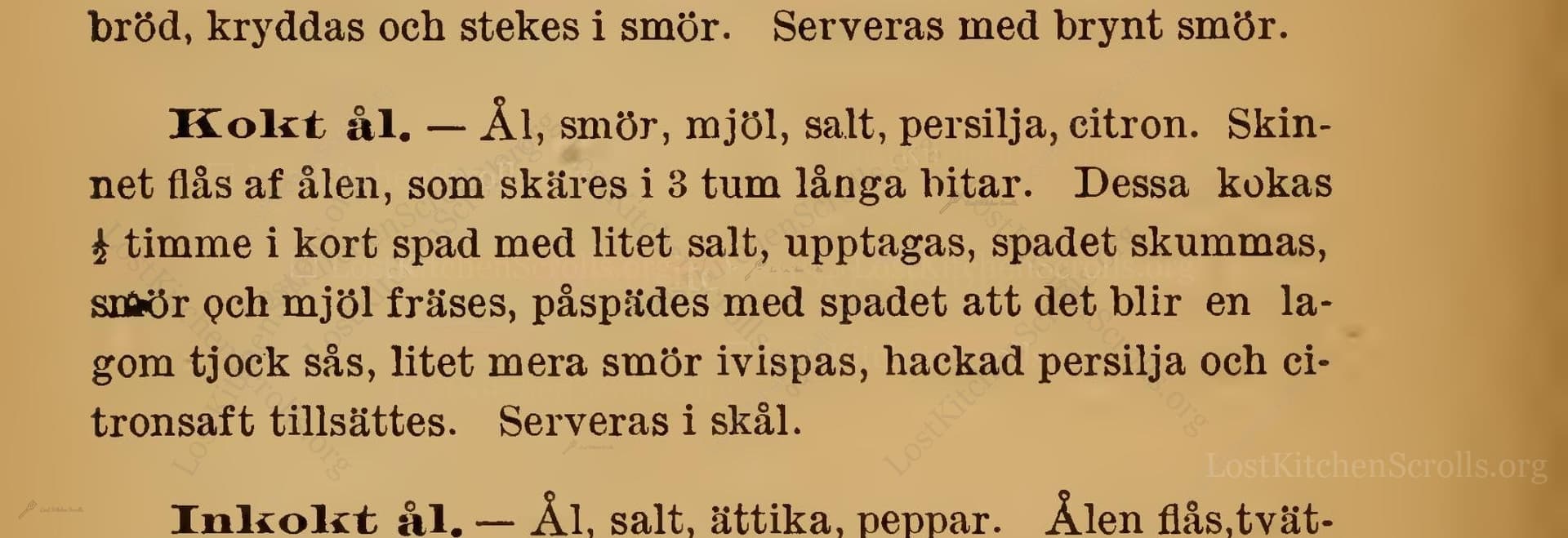Kokt Ål
"Boiled Eel"
From the treasured pages of Praktisk, illustrerad kok-bok för Svenskarne i Amerika
Written by C. A. (Charles A.) Vallentin

Kokt Ål
"— Ål, smör, mjöl, salt, persilja, citron. Skinnet flås af ålen, som skäres i 3 tum långa bitar. Dessa kokas ½ timme i kort spad med litet salt, upptagas, spadet skummas, smör och mjöl fräses, påspädes med spadet att det blir en lagom tjock sås, litet mera smör ivispas, hackad persilja och citronsaft tillsättes. Serveras i skål."
English Translation
"— Eel, butter, flour, salt, parsley, lemon. The skin is removed from the eel, which is then cut into 3-inch long pieces. These are boiled for ½ hour in a small amount of water with a little salt, then taken out. The broth is skimmed; butter and flour are sautéed together, then the broth is added to make a suitably thick sauce. A little more butter is whisked in, chopped parsley and lemon juice are added. Serve in a bowl."
Note on the Original Text
The recipe is written in compact, direct prose, typical of late 19th-century cookbooks, assuming the cook's familiarity with essential techniques such as making a roux or skimming stock. Spelling like 'af' for 'av' harks back to Swedish orthography of the period, and instructions are often less detailed than in modern recipes, reflecting an era when household cooks relied on experiential knowledge. Measurements are imprecise ('lagom tjock sås'—a suitably thick sauce) and cooking times estimate rather than dictate, giving leeway for the cook to use their senses. This oral tradition style bridges the gap between written instruction and hands-on kitchen wisdom.

Title
Praktisk, illustrerad kok-bok för Svenskarne i Amerika (1889)
You can also click the book image above to peruse the original tome
Writer
C. A. (Charles A.) Vallentin
Era
1889
Publisher
Svenska bok-och musikhandelns förlag
Background
A practical and charmingly illustrated Swedish cookbook tailored for immigrants in America, this 1889 volume serves up a delightful array of recipes and culinary wisdom, blending Old World tradition with New World ingredients.
Kindly made available by
Library of Congress
This recipe, titled 'Kokt ål' (Boiled Eel), is drawn from the 1889 Swedish-American cookbook 'Praktisk, illustrerad kok-bok för Svenskarne i Amerika', authored by C. A. Vallentin and published in Minneapolis. It reflects the culinary traditions brought by Swedish immigrants to America in the late 19th century, blending practicality with familiarity and nostalgic flavors. Eel was a common fare in Swedish and Scandinavian cooking, particularly before the industrialization of fishing. Its appearance in a Swedish-American context shows how immigrant communities adapted their foodways, continuing to prepare familiar dishes even as some ingredients became difficult to procure in the New World.

In the 1880s kitchen, key tools for this recipe would have included a sturdy iron or tin-lined pot for boiling, a sharp kitchen knife for skinning and cutting the eel, a wooden spoon for stirring the roux and sauce, and a strainer or slotted spoon to lift out the eel and skim the broth. Additionally, a mortar and pestle for crushing herbs and a ceramic or glazed earthenware serving bowl would complete the mise-en-place, echoing the simple but functional kitchens of pioneering Swedish-American homes.
Prep Time
15 mins
Cook Time
30 mins
Servings
4
We've done our best to adapt this historical recipe for modern kitchens, but some details may still need refinement. We warmly welcome feedback from fellow cooks and culinary historians — your insights support the entire community!
Ingredients
- 1 3/4 pounds fresh eel (or if unavailable, substitute with another firm white fish such as monkfish)
- 3 1/2 ounces unsalted butter (plus 1/2 ounce extra for enriching sauce)
- 2 tablespoons (ca. 1/2 ounce) plain wheat flour
- salt (to taste; approx 1 teaspoon for poaching water)
- 2 tablespoons fresh parsley, finely chopped
- juice of 1/2 lemon
Instructions
- Begin by preparing about 1 3/4 pounds of fresh eel.
- Remove the skin—an essential step in 19th-century eel cookery—then cut it into pieces roughly 3 inches long.
- Bring a pot of water (enough just to barely cover the eel) to a simmer, adding a pinch of salt.
- Simmer the eel pieces for 30 minutes.
- Once done, lift the eel out, and skim off any scum from the cooking liquid.
- In a separate pan, melt 3 1/2 ounces of butter and whisk in 2 tablespoons of plain wheat flour, cooking gently until just golden.
- Gradually stir in about 1 2/3 cups of the strained eel cooking liquid to form a smooth sauce of medium thickness.
- Remove from the heat, beat in another small knob of butter (about 1/2 ounce), add 2 tablespoons finely chopped parsley, and the juice of half a lemon.
- Place the eel pieces in a serving bowl and pour the warm sauce over them.
- Serve at once.
Estimated Calories
340 per serving
Cooking Estimates
It takes about 15 minutes to prepare the eel and ingredients, then around 30 minutes to cook. This recipe serves 4 people. Each serving has around 340 calories.
As noted above, we have made our best effort to translate and adapt this historical recipe for modern kitchens, taking into account ingredients nowadays, cooking techniques, measurements, and so on. However, historical recipes often contain assumptions that require interpretation.
We'd love for anyone to help improve these adaptations. Community contributions are highly welcome. If you have suggestions, corrections, or cooking tips based on your experience with this recipe, please share them below.
Join the Discussion
Rate This Recipe

Den Bockfisch In Einer Fleisch Suppen Zu Kochen
This recipe hails from a German manuscript cookbook compiled in 1696, a time whe...

Die Grieß Nudlen Zumachen
This recipe comes from a rather mysterious manuscript cookbook, penned anonymous...

Ein Boudain
This recipe comes from an anonymous German-language manuscript cookbook from 169...

Ein Gesaltzen Citroni
This recipe, dating from 1696, comes from an extensive anonymous German cookbook...
Browse our complete collection of time-honored recipes



